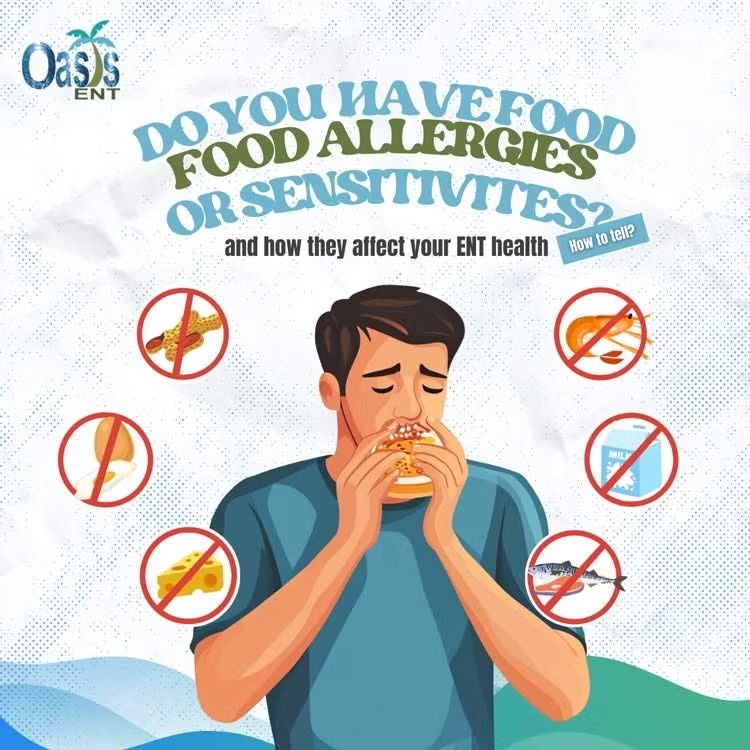How to Tell If You Have Food Allergies or Sensitivities
That stomach ache after eating pizza, the headaches that seem to follow certain meals, or that unexplained fatigue—could these be signs of food allergies or sensitivities? Understanding the difference between these conditions can feel like solving a complex puzzle, especially when symptoms overlap.
Many people brush off these reactions as “just part of life” or blame them on stress, but your body might be sending an important message. Food-related reactions can impact more than just digestion—they can contribute to chronic sinus congestion, post-nasal drip, throat irritation, and even ear infections.
Not all food-related symptoms stem from allergies. Some result from food sensitivities or intolerances, which don’t trigger the immune system but can still cause discomfort. Knowing the difference is key to managing symptoms and improving your overall health—including your ENT health. If you’re experiencing persistent sinus or throat issues after eating certain foods, it may be time to explore whether food sensitivities are playing a role.

What’s the Difference Between a Food Allergy and a Sensitivity?
A food allergy happens when your immune system mistakes a food for something harmful and overreacts. Even a small amount of the food can cause symptoms like swelling, hives, trouble breathing, or stomach issues. In severe cases, an allergic reaction can be life-threatening and require immediate medical attention.
A food sensitivity (or intolerance) does not involve the immune system. Instead, the body has trouble digesting or processing certain foods. Food sensitivities can still impact ENT health, contributing to sinus congestion, post-nasal drip, throat irritation, or even ear pressure.
Common signs include bloating, stomach pain, gas, headaches, and even lingering sinus issues after eating certain foods. If you’ve noticed a connection between your diet and your sinus or throat symptoms, identifying and avoiding trigger foods may help you feel better overall.
Common Signs of a Food Allergy
Food allergies can cause reactions within minutes to hours after eating. Symptoms may include:
- Hives or skin rash
- Swelling of the lips, tongue, or throat
- Trouble breathing or wheezing
- Stomach pain, nausea, or vomiting
- Dizziness or fainting
The most serious reaction is anaphylaxis, which can cause a dangerous drop in blood pressure and breathing problems. This requires emergency medical care and treatment with an epinephrine injection.
Common Signs of a Food Sensitivity
Food sensitivities often cause digestive problems, but symptoms can take longer to appear and are usually not life-threatening. Common signs include:
- Bloating or gas
- Stomach cramps
- Diarrhea or constipation
- Headaches or brain fog
- Fatigue
- Congestion, sneezing, post-nasal drip
Lactose intolerance, which causes stomach discomfort after eating dairy, is a common example of a food sensitivity.
How to Figure Out If a Food Is Causing Problems
If you suspect a food allergy or sensitivity, here are some steps to help identify the problem:
- Keep a Food Journal – Write down everything you eat and note any symptoms you experience. Look for patterns to see if certain foods cause problems.
- Try an Elimination Diet – Remove suspected foods from your diet for a few weeks, then slowly add them back one at a time. If symptoms return, that food may be the cause.
- See an ENT or Allergist – If you have symptoms of a food allergy, a doctor can do tests like a skin prick test or blood test to confirm. For food sensitivities, a doctor may suggest diet changes to find the trigger.
When to Seek Medical Help
If you ever experience swelling, trouble breathing, or a severe reaction after eating, seek emergency medical help right away. Even mild food allergies can become more serious over time, so it’s important to get tested if you suspect a problem.
Listen to Your Body: Your First Step Toward Food Freedom
Understanding whether you have food allergies or sensitivities is more than just solving a medical mystery – it’s about taking control of your health and improving your daily life. While the journey to identifying your triggers may take time and patience, remember that you’re not alone in this process.
Working with healthcare professionals, keeping detailed food diaries, and paying attention to your body’s signals are all valuable steps toward finding answers. The relief that comes from identifying and managing your food reactions can be life-changing, opening the door to more comfortable, energetic, and healthier days ahead. Ready to start listening to what your body has been trying to tell you? Schedule an appointment with us!
Disclaimer: This content is for informational purposes only and is not a substitute for professional medical advice, diagnosis, or treatment. Always seek the advice of your physician or a qualified healthcare provider with any questions you may have regarding a medical condition.
The information provided in this article is for informational and educational purposes only and does not constitute medical advice. It is not intended to diagnose, treat, cure, or prevent any disease or medical condition. Always seek the guidance of your physician or other qualified healthcare provider with any questions you may have regarding a medical condition or treatment.
Results may vary: Treatment outcomes and health experiences may differ based on individual medical history, condition severity, and response to care.
Emergency Notice: If you are experiencing a medical emergency, call 911 or seek immediate medical attention.


